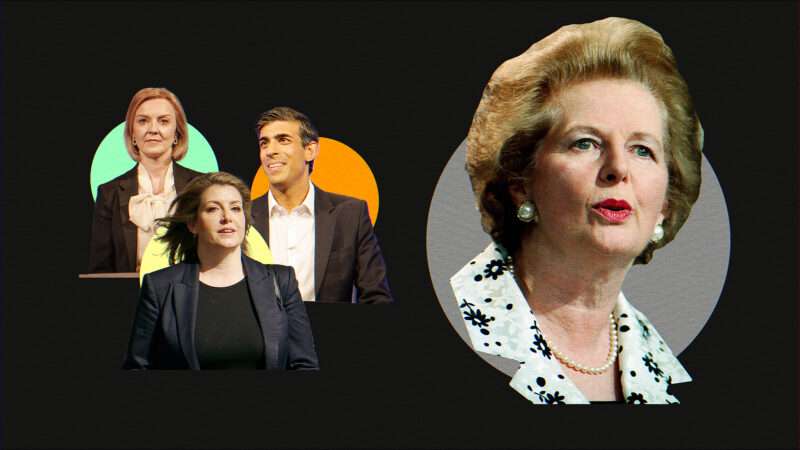
Almost a decade after the death of former British Prime Minister Margaret Thatcher, her ideas are experiencing something of a political revival in the race to succeed outgoing Prime Minister Boris Johnson. Both candidates for the leadership of the Conservative Party, former Chancellor of the Exchequer Rishi Sunak and Foreign Secretary Liz Truss, have increasingly appealed to the legacy and imagery of Thatcher as they seek to gain power.
In an interview with The Telegraph, Sunak described his economic approach as “common-sense Thatcherism” and said he would take cues from the policies she pursued as Prime Minister. Sunak has also tied his upbringing as a pharmacist’s son to Thatcher’s humble origins as the daughter of a grocer and local politician. Meanwhile, Truss has taken to copying Thatcher’s image, notably adopting the late prime minister’s preferred lavallière blouses and appearing for strikingly similar photo opportunities, including a famous picture of Thatcher holding a calf. In the case of Truss, British political commentators have relished noting these similarities on social media.
Liz Truss was asked earlier today whether she modelled herself on Margaret Thatcher.
“I reject that. I’m my own person,” she told BBC. pic.twitter.com/QO8kmm9pCG
— Pippa Crerar (@PippaCrerar) July 21, 2022
Thatcher remains a polarizing figure in British politics. She served as prime minister from 1979 to 1990 and led the Conservative Party from 1975 to 1990. Though she was criticized for accelerating the rate of deindustrialization in Britain’s northern counties, Thatcher is credited for restoring British leadership on the international stage and salvaging the country’s finances after years of economic malaise. Inspired by the monetarist theories of Friedrich Hayek and Milton Friedman, Thatcher oversaw the privatization of many government monopolies, including British Airways, British Steel, and other languishing state-run companies. Her government also cut inflation from over 25 percent in the 1970s to single-digit rates by the end of her time in power.
For almost two decades after she left office, Thatcher’s influence over the Conservative Party was undeniable. In particular, her legacy of skepticism toward the European Union propelled weak leaders like William Hague and Iain Duncan Smith to the helm of the party. Their tenures, especially Hague’s, saw the Conservative Party lose successive elections against Tony Blair’s New Labour, as voters rejected their hard-line positions on the European Union and immigration. The election of David Cameron as party leader in 2005 was seen as a symbolic distancing from her legacy, as he moved the Conservative Party toward the center and modernized its positions on the environment and social issues.
Since Johnson announced his resignation on July 7, the Conservative Party has been conducting internal ballots to choose their next prime minister. After two weeks of secret ballots, Sunak and Truss came out on top in a vote of the parliamentary party yesterday morning. They will now go to a runoff election on September 5, where the Conservative Party’s 180,000 active members will have the final say on who leads them into the next election.
But at least one Thatcher expert questions their sincerity. “I don’t really think that he intends any of these things,” Richard Toye, a professor at the University of Exeter and widely cited Thatcher expert, tells Reason, in reference to Sunak’s purported Thatcherite economic vision. He doubts Sunak will implement the monetarist policies that defined Thatcher’s first term or revisit the privatization of industries that remain under state control. Indeed, many British conservatives, including Truss, have called Sunak out for not opposing tax increases as a way to pay off pandemic debts and lower inflation.
Instead, Toye sees Sunak and Truss as appealing to the image of Thatcher among conservatives more so than the actual historical Thatcher and her unique political philosophy. “It’s about a simple signaling that you favor a symbolic Thatcher that is beyond criticism for many conservatives,” he says.
Toye also warns that the allusions could fall flat. “I think Truss was photographed in a tank or something fairly ridiculous like that, mimicking what Thatcher did” he noted, referring to a November 2021 image of Truss riding in a tank during a visit to British troops stationed in Estonia that went viral. That image grabbed attention for its similarities to a famous photo taken of Thatcher riding in a tank when she visited British troops in West Germany in 1986.
Troye cautions that the efforts to copy Thatcher could backfire. “In Thatcher’s case, it looked less silly.”
The post Margaret Thatcher Looms Large in British PM Race appeared first on Reason.com.
from Latest https://ift.tt/f4oARIO
via IFTTT